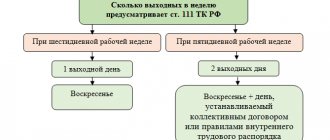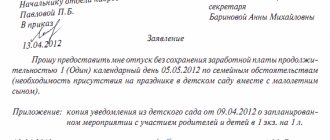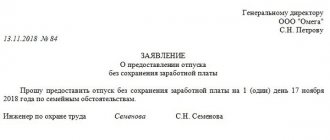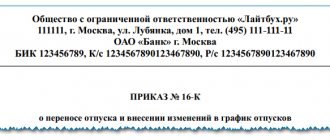The legislative framework
Everything related to the regulation of the relationship between the employer and the employee-donor is included in the current regulations.
Among them are:
- Federal Law of July 22, 2012 No. 125-FZ “On the donation of blood and its components.” This document defines the financial aspects and also establishes the legal basis for protecting the health of blood donors and its components, recipients and the protection of their rights.
- Order of the Ministry of Health of the Russian Federation No. 364 of September 14, 2001 describes the restrictions associated with blood donation. In particular, this document lists cases when sampling of biomaterial is unacceptable.
- Art. 186 of the Labor Code of the Russian Federation establishes guarantees and compensation for employees in the event that they donate blood.
Any violation of regulatory documents is unacceptable.
If the company's management ignores the law, a complaint should be filed with law enforcement agencies. Download for viewing and printing Federal Law No. 125-FZ of July 22, 2012 “On the donation of blood and its components”
Order of the Ministry of Health of the Russian Federation dated September 14, 2001 N 364
Labor Code of the Russian Federation dated December 30, 2001 No. 197-FZ
How to take time off for donor days? Donor benefits.
Law 125-FZ of 2012 lists the following benefits for donors:
-free food on the day of donation (this includes meat, red fish, dairy products, chocolate); lunch can be replaced with food: caviar, juice, fish.
The law prohibits replacing donated food with monetary compensation.
-employees who donate the maximum possible number of blood components twice during the year are first provided with preferential resort vouchers.
According to Part 1 of Art. 22 Federal Law No. 125 “On blood donation and its components”, on the day of donation, all donors are provided with free food. This benefit is financed by the medical organization that collects the blood. The diet can be viewed in Order of the Ministry of Health of the Russian Federation dated December 13, 2012 No. 1039. Free food can be replaced at the request of the donor for financial compensation in the following cases: blood is donated in a mobile blood collection complex; Donation is carried out in a room provided free of charge. In other cases, replacement is not allowed. Compensation for food in monetary terms will be 5% of the subsistence level. In this case, the PM established at the level of a specific region is taken into account.
According to Part 3 of Art. 22 Federal Law No. 125, donors who: are officially employed (at their place of work) have the primary right to purchase vouchers for sanatorium and resort treatment; students (at the place of study). Fairly or not, self-employed and unemployed persons are deprived of this right.
People with the title “Honorary Donor” have even greater privileges (who have donated blood for free at least 40 times and plasma at least 60 times). They have the right:
-to be treated out of turn in state and municipal medical institutions;
-take vacation at any time at your discretion;
-first of all, purchase vouchers to sanatoriums and resorts;
-receive a cash bonus every year.
What benefits and payments an honorary donor of Russia can receive is stated in Article 23 of the Federal Law “On the Donation of Blood and Its Components”: Selecting the date of paid leave at a time convenient for the donor. Providing medical care in state and municipal medical institutions without waiting in line. Extraordinary receipt of preferential health vouchers. Receive a fixed cash payment once a year. The annual payment to honorary blood donors in 2021 will be 14,145 rubles. 98 kopecks This amount is not taxed. Every year, due to inflation, payments are indexed.
An Honorary Donor of the USSR enjoys the same benefits and receives the same payments as an Honorary Donor of Russia. That is, these two statuses are equalized by Part 3 of Article 23 of the Federal Law “On blood donation and its components.”
In each region, in addition to the above benefits, there may be additional benefits established by local regulations and sponsored from the regional budget.
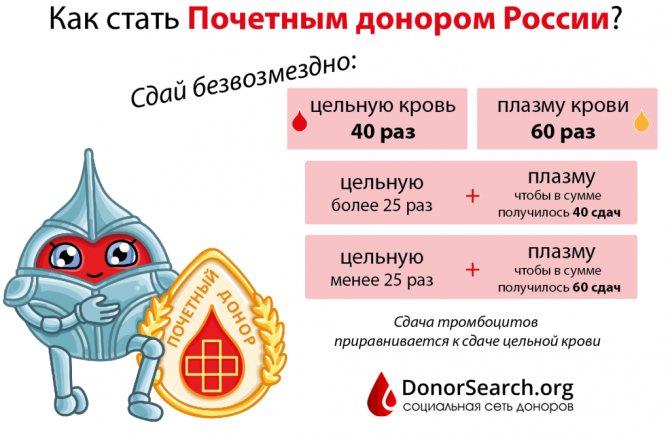
Law No. 125-FZ obliges employers to provide social guarantees to donors. Article 186 of the Labor Code of the Russian Federation specifies these guarantees.
-On the day of the medical examination before delivery, the employee has the right not to go to work.
-The day of donation is also a non-working day.
-If, in agreement with the administration, an employee works on this day, he is entitled to another day of rest (time off) - in return for the one worked.
-All donors have the right to an additional day of time off for donating blood to restore health.
Labor legislation prohibits going to hard and unsafe work after a blood draw; the employee in this situation will not receive a day of rest to replace the time worked.
Each donor has the right to one additional day to restore health, provided that he donated blood during working hours and did not go to work. If, after visiting the blood transfusion station, he continued to perform his official duties, he is entitled to 2 days off - “other” (replacement) and “additional”. Whole blood can be donated no more than 4-5 times a year; plasma and other elements (platelets, erythrocytes, leukocytes) are donated no more than 12 times a year. Thus, during the year, an employee can accumulate from 5 to 24 days off.
Labor legislation meets the interests of people if they donate blood during non-working hours: on weekends, holidays, on vacation. In this case, they are entitled to another day of rest (Part 3 of Article 186 of the Labor Code). In addition, they have the right to an additional day - a total of 2 days off.
Choosing the day of the medical examination and the day of delivery is the absolute right of the employee. Even if he does not inform the employer about his absence during working hours and then brings a certificate of the established form, these actions do not qualify as absenteeism, and the missed day is subject to payment.
The possibility of working on the day of donation must be agreed with the administration.
-If the initiative comes from the employer, he draws up an order to perform work duties on that day, but the employee has the right to refuse work.
-If the initiative comes from the employee himself, he must write a statement and obtain permission from the administration, since not all work is allowed on the day of blood sampling.
The choice of days of rest (both replacement and additional) is the exclusive right of the employee; he specifically indicates them in his application. Rest days for donating blood must be agreed upon with the employer and carried out by order indicating the date, method of payment and justification for the benefit. The most common way to use such time off is to add it to your next vacation. Although the employee can use them at other times at his own discretion.
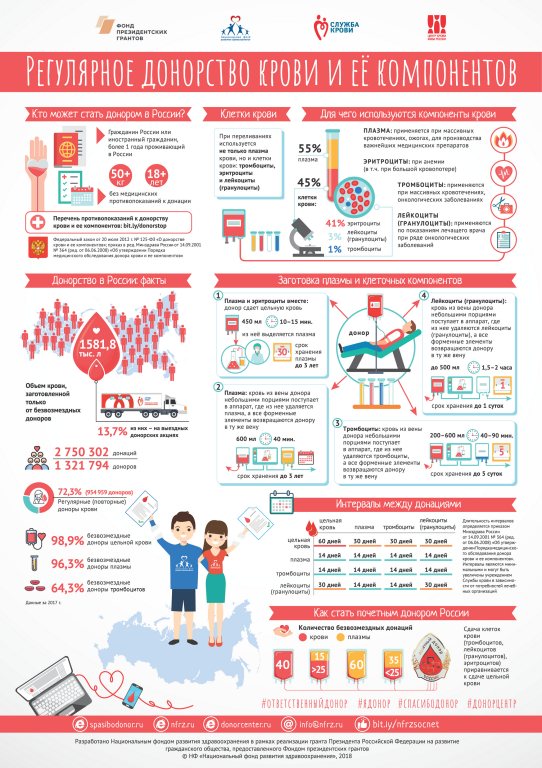
Donor days must be used within 12 months from the date of blood donation. After this period, the benefit becomes invalid. The second limitation of such a benefit is a change of place of work. If the employee did not use the days off for donating blood at the old place, the new employer has the right not to provide or pay for them.
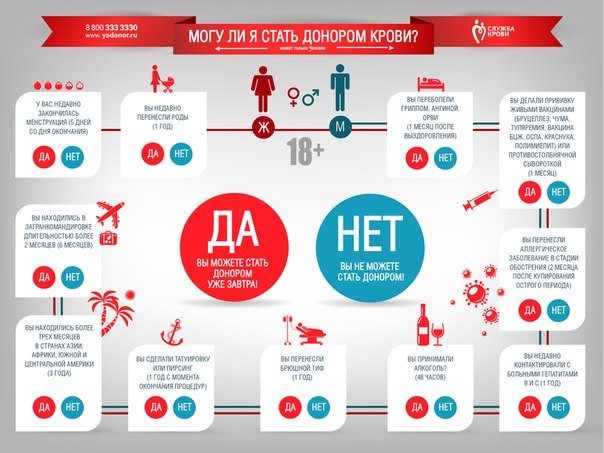
The benefits of donation (for the health of the donor) are the following:
-activates the restoration of the body and normalization of blood circulation;
-promotes the prevention of cardiovascular diseases;
-improves immunity; has a beneficial effect on the liver and spleen.
Harm to the health of a recreation center is possible when:
- the permissible delivery volumes are exceeded;
- fences occur too often.
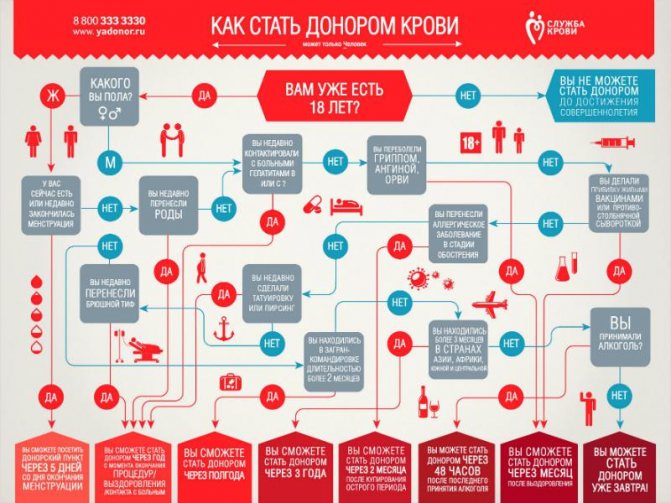
All donors, without exception, enjoy the preferences established by federal legislation, regardless of their place of residence in the Russian Federation.
Source. https://juresovet.ru/lgoty-donoram-krovi/
https://rabotnik-info.ru/otgul/za-sdachu-krovi/
Who can be a donor

According to the law, people who have reached the age of eighteen or have acquired full legal capacity before reaching the age of eighteen, who have expressed a voluntary desire to donate blood and its components, have undergone a voluntary medical examination and have no medical contraindications for donating blood and (or) its components, can donate blood.
A medical examination of the donor before donating blood and the issuance of certificates about his state of health are free of charge.
Before collecting biomaterial, this person must:
- verify your identity using a passport or other identification document;
- inform the doctor about all past infectious diseases, being in contact with infectious patients, staying in areas where there is a threat of the emergence and spread of mass infectious diseases or epidemics, about the use of narcotic drugs, psychotropic substances, about working in harmful and dangerous working conditions, and also vaccinations and surgical interventions performed within a year before the date of blood donation;
- undergo a medical examination;
- donate blood to determine its characteristics: group, hemoglobin level and hematocrit.
- Entering the research results into the donor's card;
- Based on research, the transfusiologist allows for donation and determines its type, as well as the volume of blood and its components taken;
- Registration of “Referrals for blood donation, plasmapheresis, etc.” (form N 404/у);
- the donor is sent to the department for collecting blood and its components.
The biomaterial is selected in the following form:
- blood;
- plasma;
- immune plasma;
- plasma for fractionation;
- blood cells.
If it is rented for a fee, then its price depends on the type of material. For example, in 201, for 100 ml of simple blood they paid up to 8% of the living wage in force on the date of blood donation, established in the subject of the Russian Federation where the citizen donates blood. The size of the fee depends on the blood phenotype and the presence of red blood cell antigens.
They pay significantly more for blood cells:
- platelets - 35% of the subsistence level;
- red blood cells - 25% of the subsistence level;
- Leukocytes - 45% of the subsistence level;
- Plasma - 15% of the subsistence level.
Each citizen from whom biomaterial has been collected must be given hot meals in a medical facility.
This mandatory preference can be replaced by a cash payment
in cases established by the Ministry of Health:
- donation of blood and (or) its components using mobile blood collection complexes;
- if the donor submits a written application to replace free food with monetary compensation;
- in case of donation of blood and (or) its components in premises provided by the employer.
Its size is equal to 5% of the established subsistence level of the working-age population in the subject where blood donation is made.
Documenting
Taking time off to donate blood does not require advance scheduling, but does not replace the need to document paid time off. The law does not require donors to notify employers about time off in advance. However, it is better to plan this action and warn the organization’s management about the impending absence. But failure to appear without notice will not result in dismissal or reprimand, provided that the employee presents a certificate from a medical institution.
The standard registration procedure requires the following step-by-step actions:
- The donor writes an application for time off.
- An order is issued to issue a day off and pay for it.
The employer is obliged to reflect the fact of the employee’s absence in the timesheet and the reason for it. All actions must be subsequently confirmed by a medical certificate, which will prove the validity of the declared act.
Reflection in the accounting sheet
The time sheet is an actual reflection of the activities of each employee. It records all attendances and notes the reasons for non-appearances. Information in the report card form is entered in coded form, which allows not only to condense it, but also to prevent discrepancies. Since the information entered into the cells of the document subsequently forms the basis for salary calculations, they must be entered correctly. As a rule, each site has its own employee responsible for maintaining the timesheet; the responsibilities for filling it out are assigned to him in the job description.
Each reason for absenteeism has its own coding, which is presented in two versions:
- Literal.
- Numerical.
Unified forms for keeping track of working hours contain a list of codes recommended for use. Organizations can develop their own symbols. To mark donor days in the report card, the following codes are used:
- G or 23 – medical examination, as well as donation of blood and its components.
- OV or 27 – additional day off.
When the employee comes to the workplace on the day of delivery, a mark of attendance is placed - I or 01.
Employee statement
If an employee goes to fulfill his social duty and wants to take advantage of the guarantees provided to him on the same day, then he may not write a statement at all. When returning to work, he is obliged to provide the employer with a medical certificate confirming the justification of his absence, and the HR department will prepare an order. But if there is a desire to transfer the due time off to another time, then you cannot do without an application.
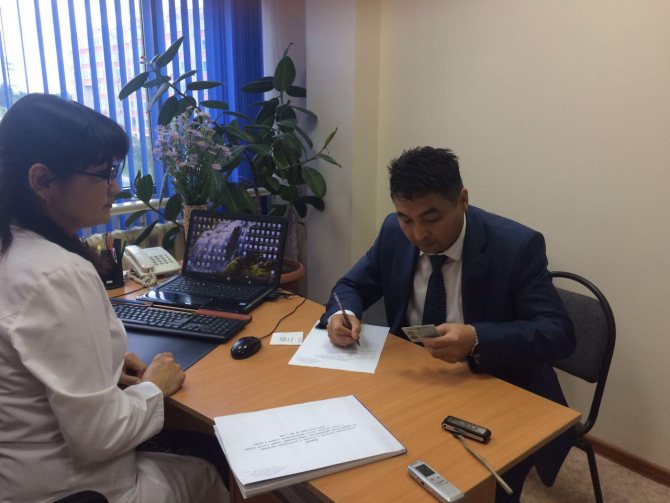
To compile this document, you must use the proposed scheme:
- The header is standard and contains information about the organization and the donor. It contains the name of the company, full name and position of the manager, full name and position of the applicant.
- The text expresses a request for days of rest. The reason for their provision is indicated. The start and end dates of time off are specified.
The document is signed by the employee and the date of submission is indicated at the bottom.
Order
An order for the issuance of donor days and their payment is drawn up for any scenario. This document confirms that the employee was on leave with the knowledge of the employer and gives instructions for further actions within the organization.
The order is drawn up in any form and contains the following information:
- Document number and date of publication.
- Place of compilation.
- Information about the donor - full name and position.
- Reason for issuing time off.
- Date of immediate rest.
- Date of performance of public duty (if it differs from the day of rest).
- The basis for issuing an order is an application and a medical certificate.
- Signature of the head of the organization.
- Employee's introductory signature.
Based on the issued order, data is entered into the working time sheet and the average wage is calculated for the days of registered time off.
Providing rest days
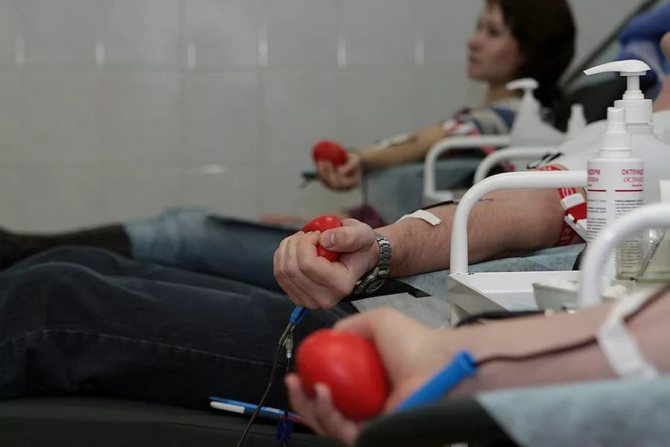
According to this article of the Labor Code, the employer is obliged to release a person from work:
- on the day of blood donation;
- per day associated with the preliminary medical examination.
If, in agreement with the employer, the employee went to work on the day of donating blood and its components (with the exception of work with harmful and (or) dangerous working conditions, when the employee’s going to work on this day is unacceptable), he is provided with another day of rest at his request.
If blood and its components were donated during the period of annual paid leave, on a day off or a non-working holiday, then the employee, at his request, is given another day of rest.
After each day of donating blood and its components, the employee is also given an additional day of rest. Such a day of rest, at the request of the employee, can be added to the annual paid leave or used at other times within a year after the day of donation of blood and its components.
There are various options for organizing the selection of biomaterial.
As a rule, people encounter the following nuances:
- If you need to donate blood urgently, then it is not necessary to inform management about going to the hospital. Proof of the manipulation performed will be a certificate in the form:
- No. 401/u - confirms the fact of a medical examination;
- No. 402/у - material selection.
Missing work in this case is not absenteeism. But be sure to get a certificate from a medical institution and present it to management.
- If the selection was made during sick leave or any vacation, then this day is not a day off and is not paid. But the employer is obliged to give the person one more (that is, second) day off.
- If your superiors do not allow you to leave work to donate blood, your opinion can be ignored. In this situation, the law is on the side of the person who decides to help his neighbor.
A mandatory act is to inform management about the fact of donation by providing a certificate. It should be submitted to the HR department for accounting.
Procedure for receiving days off

As a rule, on the day of biomaterial collection, people do not come to work. But this rule is not mandatory.
It is perfectly acceptable to return to your workplace after donating blood. Then management will be obliged to give the employee two days off at will.
Additional days off are issued by order.
To compile it, two documents are required:
- employee statement;
- certificate from the hospital (No. 402/u).
These documents serve as the basis for issuing an order.
Some types of work are prohibited on the day of blood collection.
It is important to understand that the legislator gives the donor the opportunity to independently choose when to use the day off for the donor day. This means the following options:
- any day upon request;
- along with the next vacation.
In any case, it is necessary to write a corresponding statement containing a request to give a day off for donation.
Documentation of an additional day of rest for the donor
Due to the fact that not every citizen is capable of voluntarily providing a certain volume of blood for the benefit of another person, many employers have not encountered the documentation of additional days of rest for such employees. If there is a donor employee in the organization, the head or specialists of the office management department are required to keep a journal reflecting the following information:
- Date of blood sampling from the subordinate;
- Number of the official certificate from the medical institution, which confirms the fact of delivery of the biomaterial;
- Information about whether the employee used his donor day immediately or left it for the future, wanting, for example, to add it to annual leave.
It is recommended that the rules for providing donor days (days off for donating blood) be recorded in a collective labor agreement signed by the employee. If these conditions are not agreed upon in advance between the parties to the labor relationship, the subordinate will be able to take advantage of the available days off at any time convenient for him, regardless of the consent of the manager, which may negatively affect the production process.
A citizen must use the additional day of rest provided for donation within one year after receiving it, otherwise it will automatically “burn out.” Since these days off are subject to payment by the employing organization, they are counted towards the person’s insurance period, which is necessary for calculating old-age benefits. If at the time of termination of the employment contract the employee has accumulated several additional days of rest, they can be used before dismissal or they can be requested from the employer to provide financial compensation for them.
Payment for rest days
An important point for employees is wages on donor days. Its calculation is subject to current legislation.
It means that:
- If blood was donated on a working day and the person was working, he will be paid in the amount of the employee’s average earnings.
- If a holiday period was used for the act of donation or the person did not work on that day, then the payment is also in the amount of average earnings.
You can estimate approximately how much money they will give for this day off if you take the accruals for the previous year and divide by 12 and 29.4 (the average monthly number of calendar days).
Replacing a rest day with money
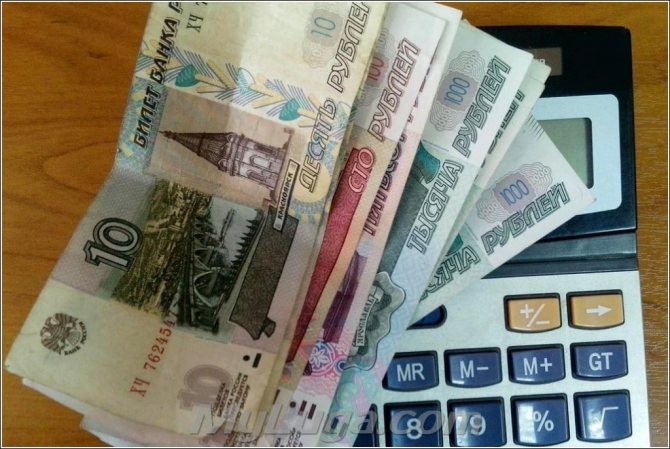
At the request of the employee, the administration was obliged to compensate him for unused severance with a sum of money equal to average earnings.
Currently, such legal norms no longer apply.
According to current legislation, a citizen is obliged to use rest days within a year from the date of selection of the material (date of certificate). Then they “burn out.”
If after the day of donation the employee changed his place of work, then at the new production he is not required to give him another day of rest. It should be used at the enterprise where he worked during the selection of biomaterial, or demand compensation upon dismissal.
How are donor days paid?
According to Russian law, donors must be paid for missed workdays. The amount is calculated based on average monthly earnings. Payment is due:
- day of collection of biomaterial;
- the next day provided for rest.
Many people are interested in who pays for donor days, whether the employer or the Social Insurance Fund. According to Russian law, management is responsible for compensating for missed work days. A request for payment or an increase in vacation must be submitted to the organization’s accounting department.

In exchange for days off, the donor has the right to receive financial compensation. This is done in two cases:
- According to the employee. A person who donated blood and did not use the weekend days due can receive monetary compensation in the amount of average earnings.
- Upon dismissal. In this case, unused rest days are compensated along with the period of unused rest.
Advice. The main thing is to keep within 1 year from the date of blood donation, otherwise the weekend will be “burnt out” and you will not be able to receive compensation for it. That is, you cannot accumulate several days over 2 or more years.
If the donor decides to go to work on the day of blood donation or the next day, it is recommended to write an application asking for permission to fulfill job obligations. This is necessary to prevent the imposition of sanctions on an employer who exploits a donor on the days of the required vacation. Fines for non-compliance with the law are quite large, so it is better not to take risks and document your desire to work.
Management Responsibility
Sometimes citizens are faced with the fact that authorities do not want to comply with legislation regarding donation. Managers try to save money and not pay for additional vacations.
In this situation, it is necessary to complain to the labor inspectorate. It is this organization that monitors the implementation of legislation in the field of relations between workers and employers.
As a last resort, you can go to court. This body always stands on the side of the donor, who performs an important mission for society.

